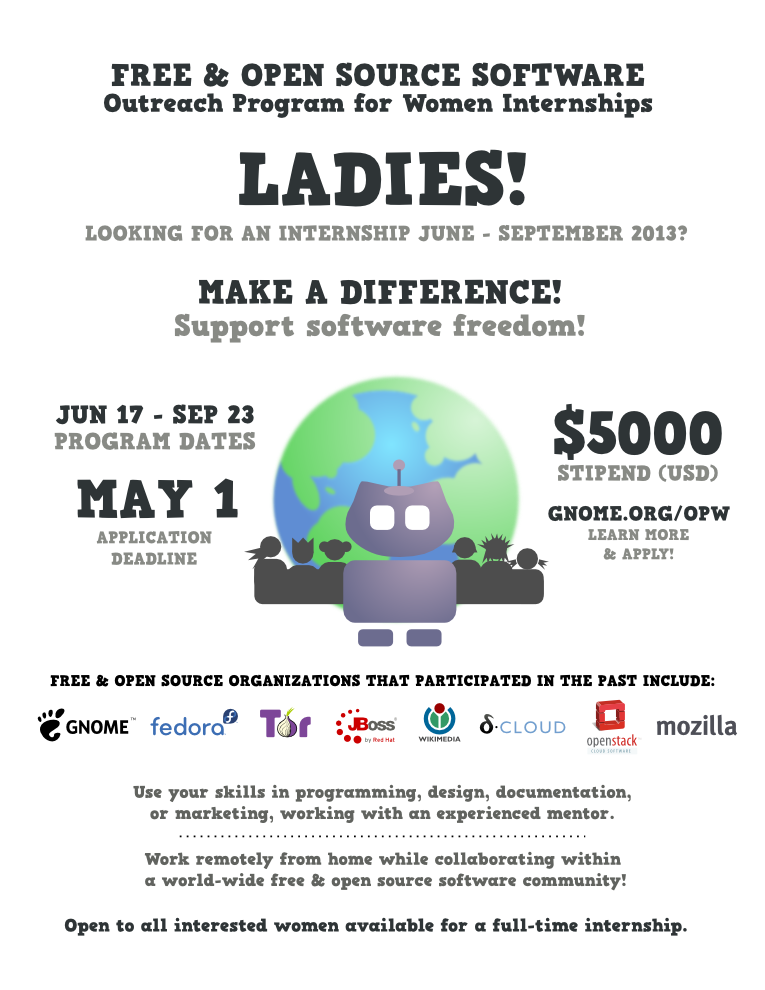GNOME Outreach Program for Women (OPW) internships – application deadline on May 1
The upcoming round of the GNOME Outreach Program for Women internships will have an application deadline on May 1 and internship dates from June 17 to September 23.
Background Information
Free and Open Source Software (FOSS) is software that gives the user the freedom to use, copy, study, change, and improve it. There are many Free and Open Source Software licenses under which software can be released with these freedoms. FOSS contributors believe that this is the best way to develop software because it benefits society, creates a fun collaborative community around a project, and allows anyone to make innovative changes that reach many people. FOSS contributors do various things: software development, system administration, user interface design, graphic design, documentation, community management, marketing, identifying issues and reporting bugs, helping users, event organization, and translations.
Many people work on FOSS as a hobby in their spare time and some are employed by companies and non-profit organizations, including ones that are sponsoring this program! Elego, Google, Mozilla, Rackspace, and Red Hat have been the corporate sponsors of the program. GNOME Foundation, Open Technology Institute, OpenITP, OpenStack Foundation, The Tor Project, and Wikimedia Foundation have been the non-profit organizations sponsoring this program. Hobbyist FOSS experience is highly valuable in the professional world because seeing the publicly available contributions and history of collaboration gives confidence to employers when making hiring decisions.
Outreach Program for Women (OPW) internships were inspired in many ways by Google Summer of Code and by how few women applied for it in the past. This was reflective of a generally low number of women participating in the FOSS development. The GNOME Foundation first started the internships program with one round in 2006, and then resumed the effort in 2010 with rounds organized every half a year. In the May-August 2012 round, the Software Freedom Conservancy joined the Outreach Program for Women with one internship with the Twisted project. In the January-April 2013 round, many other FOSS organizations joined the program.
By having a program targeted specifically towards women, we found that we reached talented and passionate participants, who were uncertain about how to start otherwise. We hope this effort will help many women learn how exciting, varied and valuable work on FOSS projects can be and how inclusive the community really is. This program is a welcoming link that will connect you with people working on individual projects in various FOSS organizations and guide you through your first contribution.
Application Process
The application process is highly collaborative. You are expected to start working with a mentor and ask many questions during the application process.
If you have general questions at any point during the application process, you are welcome to email them to opw-list@gnome.org or ask them on the #opw IRC channel on GIMPNet (irc.gnome.org) , where you are encouraged to hang out throughout the application process. opw-list@gnome.org is a private list and your inquiries will only be visible to the coordinators and mentors for the program. Please start the subject line for all your e-mails to this list with a string [INQUIRY]. For organization-specific questions, please use the communication channels described on the page for each organization. Each project you will consider will have its IRC channel, and you should join it for the fastest way to get your project-specific questions answered and communicate with your mentor. It’s easy to connect to IRC.
You can see further information about the internships and application process here.
